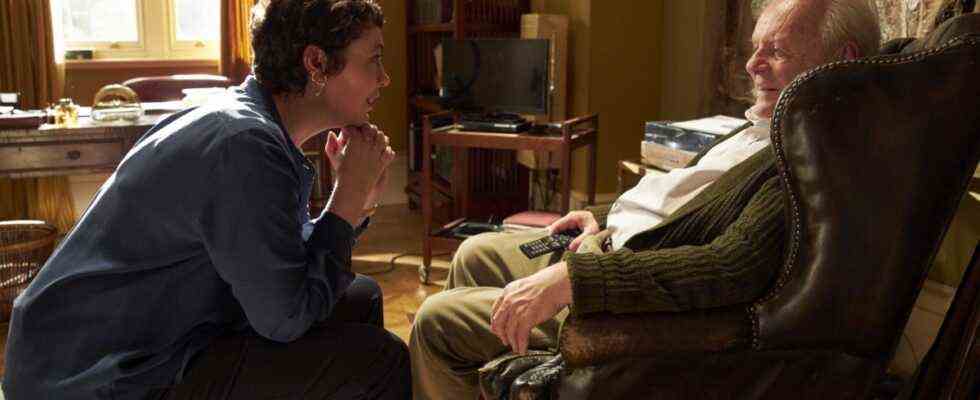Cinema begins with disintegration. Namely the reality in scenes. Which are then assembled into something new. That is why film is the medium of dream and madness. What about dementia? This is where things get complicated, because it undoubtedly means the progressive fragmentation of perception, but it also leaves less and less that could still be put together. Nevertheless, the dementia film enjoys great popularity. If Til Schweiger and Michael Haneke can agree on a subject, there must be something to it.
Florian Zeller’s film adaptation of his own successful play “Le Père” (The Father) is currently being celebrated as the most successful exploration of the difficult topic since Haneke’s “Amour”. Right? In any case, the Academy rewarded the film with two Oscars: for the best adapted screenplay and above all for Anthony Hopkins as the best leading actor in the role of the increasingly disoriented patriarch Anthony. His daughter Anne (Olivia Coleman) takes care of him. Maybe he lives with her too. And maybe she will soon leave him in the care of a nurse to move to Paris with her new husband. You can’t say that exactly. Because Zeller’s trick is that we as viewers know little or nothing more than Anthony.
We are in London, that much is clear. The conditions are middle class. The interior, in which almost the entire plot takes place, could also serve as a backdrop for a Yasmina Reza or Daniel Kehlmann chamber play, only slightly old-fashioned British variations. But that Well-made chamber play is surreally shot to pieces, so to speak.
There are logical gaps between seemingly everyday scenes, suddenly there are people in the apartment where Anthony just seemed to be alone. Details change, there are déjà-vu-like repetitions, and again and again there is talk of a second, apparently very beloved daughter. Is she dead? Lost? Zeller stages this with the classic means of suspense and the haute cuisine ingredients of art house cinema: suggestive tracking shots, precise frames, opera arias for aesthetic intensification and a quality score by Ludovico Einaudi for the right sound atmosphere.
Juries love traditional auteur craft, and some reviewers wrote that “The Father” is almost a genre film. But that’s a misunderstanding. An artfully turned inconsistent reality does not make a psychological thriller. Zeller never leaves any doubt that we are dealing with a seriously ill old man. Whose world is confusing, but the ground is not pulled from under our feet, as Martin Scorsese did in his underrated “Shutter Island”.
The exquisite stylistic devices remain illustrative: This is what dementia could feel like. That doesn’t make “The Father” a bad, but rather conventional film on a high level. Hopkins plays his Anthony, apart from a few small capers, with the sovereign modesty of the old master. He was definitely given his second Academy Award after “Silence of the Lambs”.
But even the strongest leading actor cannot resolve the contradiction with which every narrative attempt is confronted to formally reflect on dementia, perhaps even to make it understandable: one tries to tell of a development that is nothing more than the silence of all narration. Even death is more accessible. We have images and myths for him, we can imagine an afterlife. The gradual loss of all cognitive abilities, the decay of the living personality seems to be the most brutal negation of everything that defines us as human beings. Perhaps one should learn from physics: measure the radiation that is generated during decay.
In the final scene of “The Father” the camera pans out of the window and zooms into rustling tree tops until they flicker like the hyper-real vegetation in a computer game. At first glance, it’s a very touching picture. But then you think: dangerously close to the vegetables.
The Father, UK 2020 – Director: Florian Zeller. Book: Christopher Hampton, Zeller. Camera: Ben Smithart. With Anthnony Hopkins, Olivia Colman, Imogen Poots. Distribution: Tobis, 98 minutes.

